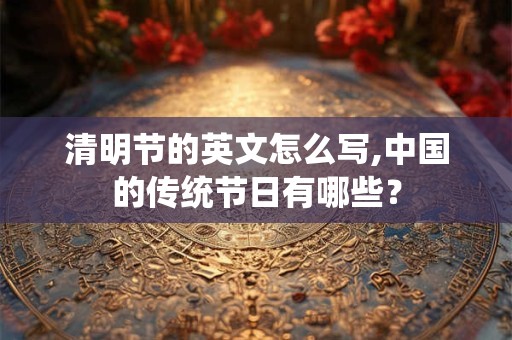In the heart of spring, where the gentle breeze whispers through blooming flowers and the warm sun touches the earth, the Chinese people celebrate one of their most cherished traditional festivals—Qingming, also known as Tomb-Sweeping Day. This festival holds deep significance as it honors ancestors and respects the deceased, a tradition that has been passed down through generations.
清明节的英文怎么写
The English translation of Qingming Festival is "Tomb-Sweeping Day" or "Ancestors' Memorial Day." It is a time when families come together to honor their ancestors, pay their respects to the departed, and celebrate the beauty of spring.
中国的传统节日有哪些
China, with its rich cultural heritage, boasts a plethora of traditional festivals that are celebrated throughout the year. Each festival carries its unique customs, history, and significance, reflecting the diverse cultural tapestry of the nation.
春节
The Spring Festival, also known as Chinese New Year, is the most important and widely celebrated festival in China. It marks the beginning of the lunar new year and is a time for family reunions, feasts, and the exchange of red envelopes filled with money. The festival is characterized by the vibrant display of red lanterns, dragon and lion dances, and the traditional custom of cleaning the house to sweep away bad luck.
端午节

Duanwu Festival, or Dragon Boat Festival, is celebrated on the fifth day of the fifth lunar month. It commemorates the death of Qu Yuan, a loyal minister and poet who drowned himself in the Miluo River. The festival involves dragon boat races, eating zongzi (sticky rice dumplings), and hanging mugwort leaves and calamus to ward off evil spirits.
中秋节
The Mid-Autumn Festival, also known as Moon Festival, is celebrated on the 15th day of the eighth lunar month. It is a time for family gatherings, moon viewing, and enjoying mooncakes, a traditional pastry. The festival is based on the ancient custom of celebrating the moon's fullness and is often associated with romantic love and the legend of Chang'e, the moon goddess.
重阳节
Chongyang Festival, or Double Ninth Festival, is celebrated on the ninth day of the ninth lunar month. It is a day to honor the elderly and is marked by climbing mountains, enjoying chongyang cake, and wearing chongyang flowers. The festival is believed to bring good health and longevity.
清明节
As mentioned earlier, Qingming Festival, or Tomb-Sweeping Day, is celebrated on the fourth day of the fourth lunar month. It is a day to honor ancestors and pay respects to the departed. Families visit graves, clean tombstones, and offer food and incense. The festival is also a time to enjoy the blooming flowers and the beauty of spring.
冬至
The Winter Solstice is celebrated on the 21st or 22nd day of the twelfth lunar month. It marks the longest night and shortest day of the year and is a time for family reunions and feasting. People typically eat dumplings or tangyuan (sweet rice balls) to signify reunion and abundance.
腊八节
Labā Festival, or the Laba Festival, is celebrated on the eighth day of the twelfth lunar month. It is a day to honor Buddha and to prepare for the New Year. People make Laba porridge, a sweet porridge made from a variety of grains and nuts, and offer it to the gods and their ancestors.
祭灶节
The Kitchen God Festival, also known as the Kitchen God's Day or the Chinese New Year's Eve, is celebrated on the 23rd or 24th day of the twelfth lunar month. It is a day to honor the kitchen god, who is believed to return to heaven to report people's deeds to the gods. Families offer food and incense to the kitchen god, hoping for a prosperous New Year.
These festivals are not only a time for celebration and joy but also a time to remember and honor the past. They are a testament to the rich cultural heritage of China and the values of family, respect, and tradition that have been passed down through generations. As the world becomes increasingly interconnected, these festivals continue to be cherished and celebrated, reminding us of the beauty and diversity of human culture.
